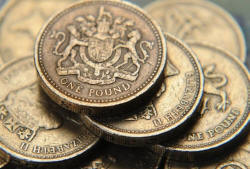|
Sterling sinks to
eight-week low
 Send a link to a friend
Send a link to a friend
 [March 14, 2017]
By Patrick Graham [March 14, 2017]
By Patrick Graham
LONDON
(Reuters) - Sterling fell to an eight-week low against the dollar and
the basket of currencies measuring its broader strength on Tuesday, hit
by fears of a prolonged bout of political jousting over the terms of
Britain's exit from the European Union.
British Prime Minister Theresa May on Monday won the right to launch
divorce proceedings with the EU on Monday, beginning two years of talks
that will shape the future of Britain and Europe.
Her spokesman dismissed as "speculation" media reports that she would
launch the talks on Tuesday, and instead suggested it would be toward
the end of the month.
Also on Monday, Scottish First Minister Nicola Sturgeon demanded the
right to hold a second Scottish independence referendum either late next
year or at the start of 2019.
Sterling initially climbed after that announcement, with analysts citing
relief among investors that the vote would not be held this year plus
known aspects of the EU exit process.

"The triggering of Article 50 has been well telegraphed and is unlikely
to cause a major stir for sterling in itself," said John Wraith, head of
UK Rates Strategy & Economics at UBS.
"It does however increase headline risk, particularly
as the opening negotiating positions of the two sides are far apart.
This may shift attention back to the UK's large current account deficit
... (it) does not bode well for sterling."
[to top of second column] |

A pile of one pound coins is seen, in central London June 17, 2008.
REUTERS/Toby Melville (BRITAIN)

Having ridden out the latest political headlines on Monday while the
dollar was weak, a resurgence for the greenback in Asian trading and
soon after opening in Europe sent sterling spinning as low as $1.2110.
It fell as much as 0.7 percent against the euro to 87.85 pence.
Sterling has been the worst performer against the dollar among major
developed-world currencies as a result, just as the U.S. Federal Reserve
prepares to raise the official interest rate premium for holding dollars
on Wednesday.
"As U.S. real yields edge higher and the prospect of further Bank of
England/Fed de-coupling looms large, it seems inconceivable that
sterling can avoid falling below $1.20," said Societe Generale
strategist Kit Juckes.
Several of the currency world's top 10 banks, who were more cautious on
the pound at the end of last year, have been aggressive in the past
fortnight in advocating more declines.
(Additional reporting by Jemima Kelly; Editing by Nigel Stephenson and
Julia Glover)
[© 2017 Thomson Reuters. All rights
reserved.] Copyright 2017 Reuters. All rights reserved. This material may not be published,
broadcast, rewritten or redistributed. |